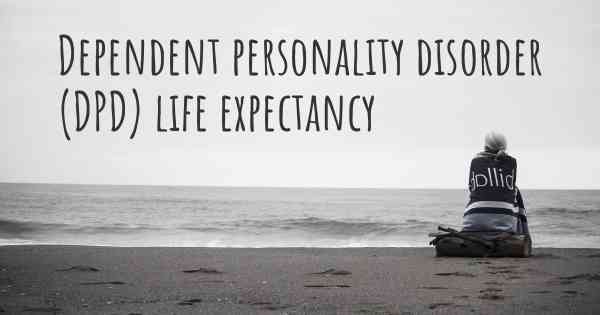What is the life expectancy of someone with Dependent personality disorder (DPD)?
Life expectancy of people with Dependent personality disorder (DPD) and recent progresses and researches in Dependent personality disorder (DPD)

Dependent personality disorder (DPD) is a chronic mental health condition characterized by an excessive need for others to take care of them. It is important to note that DPD does not directly impact life expectancy. However, individuals with DPD may experience difficulties in various aspects of life, such as relationships, decision-making, and self-confidence. Seeking appropriate treatment, including therapy and support, can greatly improve the quality of life for individuals with DPD. It is crucial to remember that each person's experience with DPD is unique, and outcomes can vary significantly. Therefore, it is essential to consult with a qualified healthcare professional for a comprehensive evaluation and personalized guidance.
Dependent Personality Disorder (DPD) is a mental health condition characterized by an excessive need to be taken care of, leading to submissive and clingy behavior. People with DPD often struggle with making decisions, lack self-confidence, and rely heavily on others for emotional and practical support. While DPD can significantly impact an individual's quality of life, it does not directly affect life expectancy.
It is important to note that life expectancy is influenced by various factors such as overall physical health, access to healthcare, lifestyle choices, and the presence of comorbid conditions. Therefore, it is not accurate or ethical to provide a specific life expectancy for individuals with DPD.
However, it is crucial to address the impact of DPD on an individual's well-being and overall health. The excessive reliance on others and the fear of being alone can lead to difficulties in establishing and maintaining healthy relationships, pursuing personal goals, and making independent decisions. These challenges can contribute to increased stress levels, anxiety, and even depression.
Early intervention and appropriate treatment can significantly improve the quality of life for individuals with DPD. Psychotherapy, particularly cognitive-behavioral therapy (CBT), can help individuals develop healthier coping mechanisms, enhance self-esteem, and foster independence. Additionally, group therapy or support groups can provide a safe space for individuals with DPD to share experiences and learn from others facing similar challenges.
While there is no cure for DPD, ongoing therapy and support can help individuals manage their symptoms effectively. It is important for individuals with DPD to work closely with mental health professionals to develop personalized treatment plans that address their specific needs.
Furthermore, self-care practices such as regular exercise, maintaining a balanced diet, getting enough sleep, and engaging in activities that promote relaxation and stress reduction can contribute to overall well-being. Building a strong support network of friends and family who understand and support the individual's journey can also be beneficial.
It is crucial to emphasize that individuals with DPD can lead fulfilling lives and achieve their goals with the right support and treatment. While the challenges associated with DPD may persist, individuals can learn to manage their symptoms, develop healthier coping mechanisms, and cultivate a sense of independence.
In conclusion, Dependent Personality Disorder (DPD) does not directly impact life expectancy. However, it can significantly affect an individual's quality of life and overall well-being. Early intervention, appropriate treatment, ongoing therapy, and self-care practices are essential for individuals with DPD to lead fulfilling lives. It is important to approach the topic with empathy, understanding, and support, recognizing that each individual's journey is unique.








